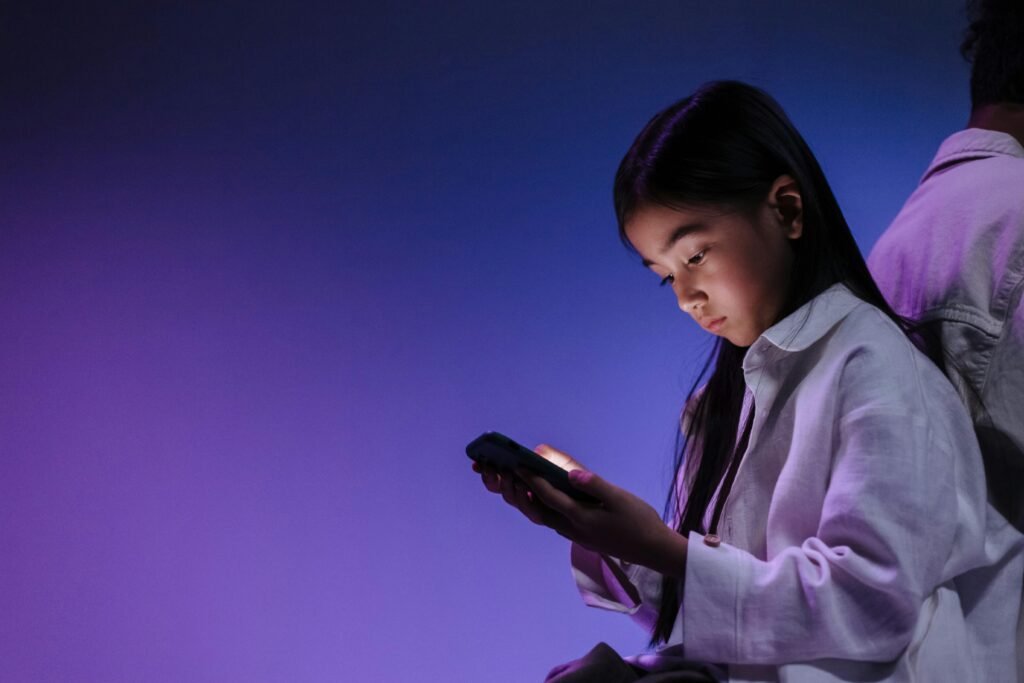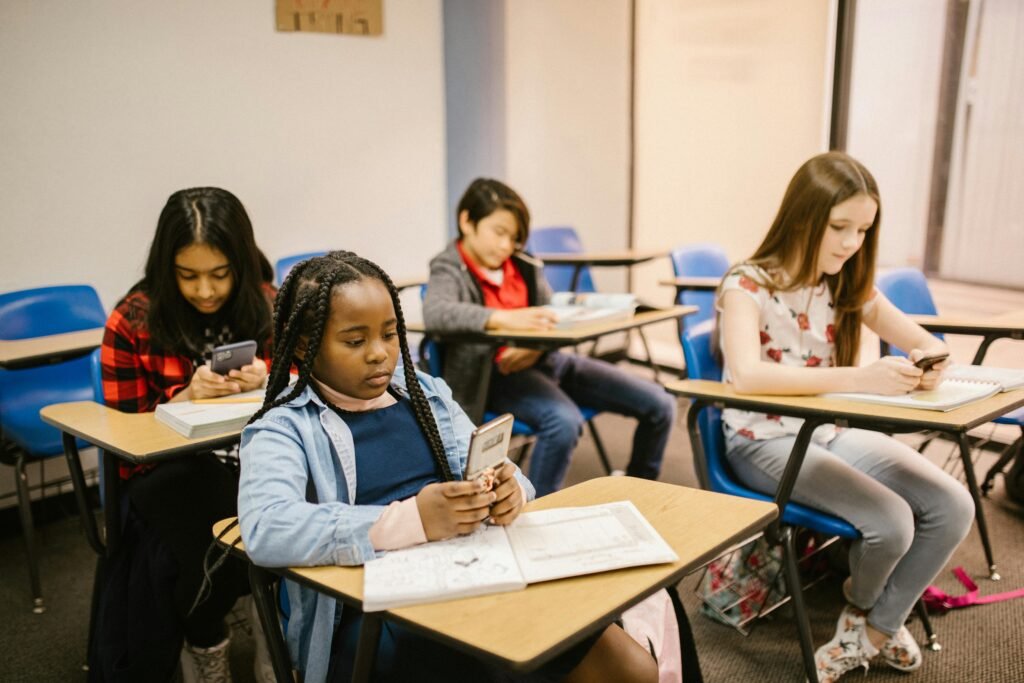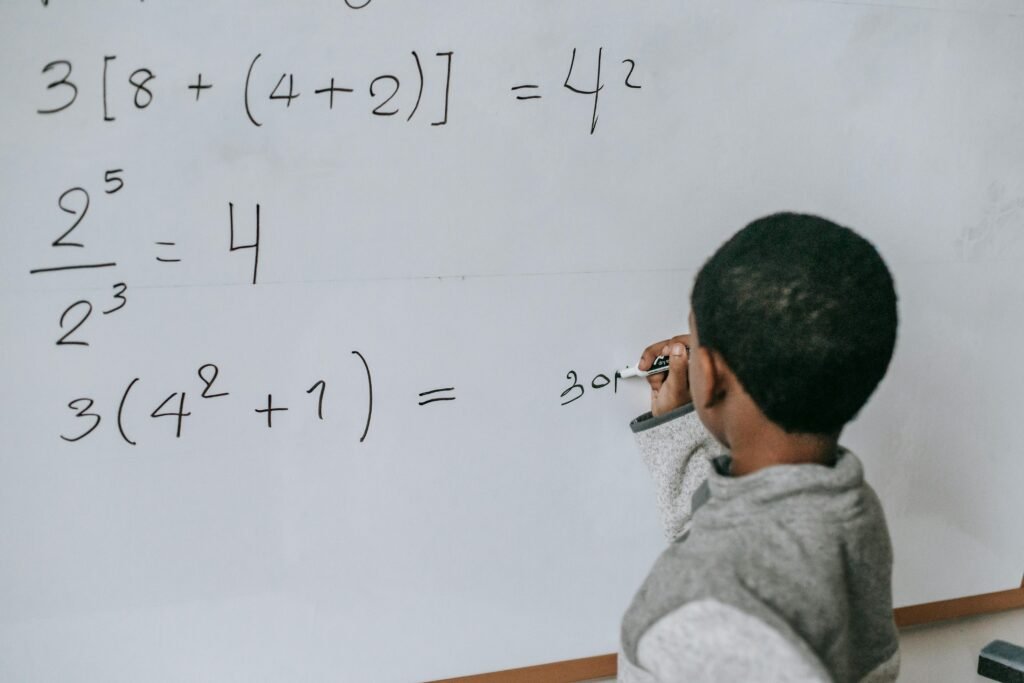Ever notice how Monday mornings feel like a battle? Your child wakes up late, complains about a headache, or just seems off. Schoolwork becomes harder. Focus is missing. Even the happiest kid can turn grumpy. If this sounds familiar, you’re not alone. There’s a hidden reason why Mondays feel like such a struggle for so many kids—and it’s not just the end of the weekend. It’s screens.
1. 82% of teens report screen time increases by over 4 hours on weekends
The Weekend Screen Surge
Most teens spend their weekdays in school, with homework, and possibly extracurriculars. This keeps screen use somewhat in check. But once Friday night hits, screens come out in full force. Netflix marathons, endless gaming sessions, hours of scrolling—sound familiar?
When teens increase their screen time by more than four hours on weekends, it’s not just more time spent relaxing. It’s time taken away from healthy habits like sleep, movement, family time, or even just mental rest. The brain doesn’t get a break. It gets bombarded with light, noise, and constant stimulation.
This sudden screen surge puts kids in a sort of “digital overdrive.” Their brains start craving fast content, quick rewards, and non-stop action. When Monday comes around and they’re expected to sit still, listen, and think deeply, it becomes incredibly hard to switch gears.
What you can do? Start with a family weekend plan. It doesn’t have to be strict or boring. Include fun non-screen options like cooking together, playing board games, taking nature walks, or even doing simple crafts. Keep one or two screen-free blocks during Saturday and Sunday and stick to them. Even just 2–3 hours off screens can reset the brain in powerful ways.
Make sure screen use still has a structure on weekends. For example, no screens before breakfast or after 9 PM. Encourage creative screen time (like making a video or coding) rather than just passive watching. The goal is not to cut out screens but to balance them with life-giving activities.
2. 63% of students go to bed after midnight on Sunday due to screen use
The Sunday Night Trap
Here’s the cycle: weekend hits, kids stay up later and later, and by Sunday night, they’re wide awake even when they want to sleep. Why? Because they’re on screens.
Screens, especially phones and tablets, emit blue light. This blue light tricks the brain into thinking it’s still daytime. So the brain delays melatonin, the sleep hormone. This means even if your child is tired, their brain isn’t ready to shut down. Add in the stimulating content (like games or TikTok), and it becomes even harder to feel sleepy.
Going to bed after midnight might not sound terrible for a teenager, but here’s the catch—school still starts early. So they wake up at 6 or 7 AM with only a few hours of real sleep. That sleep debt shows up on Monday in the form of brain fog, grumpiness, and poor memory.
To help your child, start winding down Sunday earlier. Make dinner an hour earlier. Turn off all screens at least 60–90 minutes before bed. Use that time for quiet activities—reading, chatting, stretching, or even listening to calm music.
Try a “Sunday Slow Down” routine. Dim the lights in the house. Lower the noise. Let the body naturally begin to relax. You’ll be surprised at how quickly kids respond to this shift—often better sleep, better moods, and a smoother Monday.
3. Students who use screens for more than 6 hours over the weekend see a 20% drop in Monday test performance
The Brain on Overload
More than six hours of screen use over two days might not sound extreme. That’s just three hours a day, which is pretty common. But it has a direct link to how well a child performs in school—especially on Mondays.
Studies show that after heavy screen use, kids perform worse on memory tests, focus exercises, and even basic problem-solving tasks. This 20% dip in test scores is serious. Imagine studying all week, then blowing the test because of two nights of binge-watching.
Why does this happen? Screens don’t just steal time—they steal brainpower. When the brain spends hours switching from app to app or watching fast-moving shows, it gets used to shallow focus. But school needs deep focus. It needs patience, logic, and memory—all things that get weaker after heavy screen time.
Action tip: If your child has a test or big assignment on Monday, treat Saturday and Sunday like prep days. That doesn’t mean they have to study all weekend—but make sure screen use is controlled. Swap in brain-friendly activities like puzzles, journaling, drawing, or even short review sessions.
Remind your child that their weekend habits shape their Monday performance. That awareness alone can help them make smarter choices.
4. 71% of parents notice mood changes in their children on Monday mornings
Monday Mood Swings
It’s Monday. You’re getting breakfast ready, but your child is already cranky. They don’t want to talk. They’re dragging their feet. They snap over small things. Sound familiar? You’re not imagining it.
Nearly 3 out of 4 parents report mood changes in their kids on Monday morning. And much of it traces back to screen behavior over the weekend.
Late nights, constant stimulation, lack of real rest—it all messes with a child’s emotional regulation. Their body may be tired, but their brain is still racing. On top of that, the shift from freedom (weekend) to structure (school) feels jarring. If they spent most of the weekend glued to screens, that transition feels even harsher.
The fix isn’t to lecture them—it’s to prepare their mind and mood ahead of Monday. Create a gentle transition on Sunday night. Maybe you have a family talk over dinner, or reflect on what you’re all looking forward to in the week. Even something as simple as laying out clothes for Monday or packing lunch the night before helps create emotional calm.
Also, give your child grace. If they’re moody on Monday, meet it with empathy, not frustration. Then help them name what they’re feeling—tired, anxious, overwhelmed. This emotional language builds self-awareness, and that alone can shift their mood for the better.
5. 45% of kids report feeling “mentally foggy” on Mondays
The Fog Is Real
Almost half of kids feel like their brain is in a fog when Monday rolls around. They can’t think clearly. Everything feels slow. They can’t remember what they studied last week. It’s like their brain is still asleep even though their eyes are open.

This fog isn’t random. It’s the result of screen overstimulation, lack of sleep, and poor weekend recovery. It’s like running a race and forgetting to rest afterward—your body (and brain) crashes.
Screens, especially when used at night, reduce REM sleep. REM is when the brain organizes memories and cleans out junk. If your child doesn’t get enough of it, they wake up groggy, forgetful, and scattered.
The fix? Guard the weekends. Make sleep a priority—not just the number of hours, but the quality. Encourage morning sunlight exposure on both Saturday and Sunday to help reset their internal clock. Keep caffeine (yes, even soda) low after lunchtime. And keep screen use lower in the evenings, especially before bed.
Try asking your child on Monday morning, “How does your brain feel today?” If they say “fuzzy” or “foggy,” that’s your clue. Go back and look at the weekend. Were they up too late? On screens too long? Use that info to make smarter choices next time.
6. Weekend screen use is 62% higher than weekday average
The Weekend Spike in Screen Time
During the week, kids usually have more structure. School, homework, dinner routines—they all leave less time for screens. But come Friday afternoon, all that structure disappears. No homework (hopefully), no early bedtime, and lots of “free time.” That’s when screen time takes over—and fast.
A 62% spike is huge. It means kids are nearly doubling their digital time. The worst part? Most of this time isn’t productive. It’s not creative coding or building digital art. It’s mostly passive—watching, swiping, scrolling, clicking.
The brain loves this stuff. It gives quick hits of dopamine, which feels good at the moment. But that also makes it addictive. Once the brain gets used to constant stimulation, anything slower (like schoolwork) feels boring or even painful.
Here’s how to break the pattern: shift “free time” into “fun time.” Don’t just tell your child to get off the screen—offer something better. Maybe it’s cooking their favorite meal together. Or going on a silly scavenger hunt. Or learning a new magic trick. The more real-world fun they have, the less they’ll reach for screens out of habit.
You can also involve them in tracking their screen time. Most devices now show weekly screen reports. Sit down together and look at it. No judgment—just awareness. Ask, “Do you think this number is helping you feel better or worse?” You might be surprised at their honesty.
7. 1 in 3 students skips breakfast on Monday due to oversleeping
The Missed Meal That Matters
Skipping breakfast might not seem like a big deal, especially if your child isn’t hungry. But when it happens on Mondays, and the reason is oversleeping from weekend screen habits, it becomes a real issue.
When kids stay up too late on Sunday watching shows or gaming, they wake up groggy and rushed. There’s no time to eat, so they either skip breakfast or grab something like chips or soda on the way to school. The result? Low energy, poor focus, and a harder time managing emotions all morning.
Breakfast isn’t just about calories. It sets the tone for the brain’s performance. A child’s brain runs on glucose, and if they don’t eat, their thinking speed drops. So even if they studied hard last week, their brain may struggle to access that knowledge come Monday.
To fix this, focus on Sunday night again. Help them get to bed earlier so waking up isn’t such a struggle. Then, prep a fast but healthy breakfast together. Think smoothies, overnight oats, or pre-made breakfast muffins. Even a banana with peanut butter is better than nothing.
You can also create a “Monday Morning Shelf” in the kitchen with ready-to-go breakfast snacks. Make it fun. Let them pick items and design the space. This gives them a sense of control, which makes them more likely to eat—even if they’re still waking up.
8. 50% of teachers say Monday is the hardest day to keep students focused
Teachers Feel It Too
Ask any teacher, and they’ll probably say the same thing—Monday is the toughest day in the classroom. Half of teachers say focus is at its lowest, behavior issues spike, and lessons take twice as long to get through. And it’s not because teachers forgot how to teach over the weekend.
It’s because kids come in tired, distracted, and out of rhythm. That weekend screen overload is now showing up in the form of restlessness, zoning out, and even resistance to learning.
Teachers often have to use more energy just to get students back into “learning mode.” That means more time reviewing, more reminders to stay on task, and more redirection. This affects the whole class—not just the kids who overused screens.
Want to help your child’s teacher? Help your child arrive on Monday feeling ready. That means consistent sleep, lower screen use, and a smooth morning routine. You can even talk about Monday goals with your child on Sunday night. Something simple like, “What’s one thing you’re excited to learn this week?” or “What’s something new you want to try tomorrow?”
The more your child shows up centered and calm, the easier it is for the teacher to teach—and the better your child will learn.
9. 77% of kids use devices within 30 minutes of waking up on Monday
The Morning Screen Habit
Most kids wake up, roll over, and grab their phone or tablet. For 77% of them, this happens within the first 30 minutes of waking up—often before brushing teeth or saying good morning. It’s become automatic.
But this habit does real damage. First, it floods their brains with stimulation before the day even starts. Second, it often delays important tasks like eating, getting dressed, or preparing for school. Third, it shapes their mood for the rest of the day. If they start the day with a stressful game or upsetting video, that tension sticks.
There’s also something deeper here—when screens are the first thing in the day, the brain learns that digital life is more important than real life. Over time, this reduces motivation, delays thinking, and makes school feel even harder.
So what can you do? Create a “No Screens Before School” policy—not as a punishment, but as a way to protect mornings. Replace screen time with simple rituals: playing music during breakfast, writing a quick gratitude note, or chatting about the day ahead.
You could also make mornings more fun. Instead of screens, maybe your child draws their mood on a whiteboard or picks a funny quote to share. When mornings feel meaningful, they don’t need digital distraction.
10. Cognitive performance drops by 15% after weekend binge-watching sessions
The Hidden Cost of Binge-Watching
Binge-watching has become a weekend ritual in many homes. It’s easy to think, “Just one more episode,” until it turns into five. But what’s really happening in your child’s brain during these marathons?

Their brain becomes passive. It stops actively thinking and starts consuming. After hours of doing this, it gets stuck in low-gear mode. That’s why cognitive performance—like memory, focus, and problem-solving—drops by up to 15% on Mondays after binge-watching weekends.
This isn’t just about entertainment. It’s about mental fitness. Just like muscles weaken without use, the brain loses sharpness when it’s not challenged. Binge-watching puts the brain in idle mode for hours, leaving it unprepared for the complex tasks waiting on Monday morning.
To shift the pattern, help your child build a “1–2–3 Weekend Plan.” For every 1 hour of screen time, include 2 activities that involve movement or brain use (like drawing or building), and 3 short check-ins (like quick walks, water breaks, or stretching).
Also, break the binge. Instead of auto-playing shows, set a time to stop. Use a kitchen timer if needed. And model the habit—if you’re binge-watching, they will too. Try picking one or two shows to watch together, then move on to something active or creative.
11. Only 28% of students meet the recommended 9+ hours of sleep on Sunday night
The Sunday Sleep Shortfall
Kids need sleep. Not just any sleep—deep, regular, uninterrupted rest. But on Sunday nights, after a screen-filled weekend, only about 1 in 4 students get the sleep they actually need. That’s a huge problem.
Why is Sunday night such a challenge? Because most kids stay up late Friday and Saturday, their internal clocks get thrown off. So even if they try to go to bed early on Sunday, their brain isn’t ready.
Add in the excitement or worry about the school week ahead, plus a late-night screen session, and suddenly it’s midnight—or later.
The next morning, they’re groggy. They miss breakfast. They forget their homework. And worst of all, their brain is only working at half power. Sleep isn’t just about rest. It helps kids remember what they learned, stay calm, and focus better. Without enough of it, learning becomes 10 times harder.
What can you do? Make Sunday nights sacred. Start winding things down earlier. Turn off screens at least an hour before bed. Use that time for a bath, light reading, or even just chatting about the day. Keep lights low. Keep voices soft. Send a signal to the brain: it’s time to rest.
You can even start the reset earlier—on Sunday morning. Get outside for sunlight. Move the body. Eat meals at regular times. All of this helps reset your child’s sleep clock so bedtime doesn’t feel like a battle.
12. Screen time past 9 PM on Sunday leads to 2x the risk of poor school participation on Monday
The 9 PM Cutoff That Changes Everything
If your child is still on a screen after 9 PM on Sunday, they’re twice as likely to have a rough Monday. That means not joining in class, not doing their work, and not paying attention.
Why does this one hour make such a difference? Because it interferes with sleep and sets a tone for the next day. After 9 PM, the brain needs quiet—not glowing screens. It needs to start shutting down, not ramping up. But when kids are watching videos, playing games, or scrolling social media, their brains stay alert. And alert brains don’t fall asleep easily.
Even worse, the kind of content they’re watching may increase stress. Scary movies, intense games, or even drama-filled videos can trigger anxiety—making sleep even harder to come by.
The solution is simple, though not always easy: No screens after 9 PM. Treat it like brushing teeth—it’s just what you do. Use this time for quiet bonding. Read together, play a calm card game, or listen to peaceful music.
To help with this shift, set screen limits using your device settings. Or, create a “charging station” in the living room, where all devices go to sleep by 9. When your child wakes up more refreshed and actually participates in class, they’ll feel the difference—and so will their teachers.
13. 40% of kids check social media within 10 minutes of waking on Monday
The Scroll Before Sunrise
Before they’ve brushed their teeth, changed clothes, or even fully opened their eyes, 40% of kids are already on social media by Monday morning. That scroll-first habit is hurting more than you think.
Waking up to social media floods the brain with information, emotion, and comparison. In just a few swipes, a child might feel left out, behind, or even anxious. They’re seeing what others did over the weekend. They’re checking likes and messages. And instead of preparing for school mentally and emotionally, they’re thrown into a digital whirlwind.
This habit also delays everything else. Breakfast gets skipped. Homework review gets forgotten. And the brain never gets the gentle warm-up it needs before diving into a full school day.
What can you do? Talk to your child about how they feel after checking their phone first thing. Are they more focused, or less? Happier, or more stressed? Help them notice the connection between their morning scroll and how the rest of their day goes.
Then, offer an alternative. Encourage them to try a “tech-free 10” when they wake up—just 10 minutes of quiet time without screens. Use that space for stretching, drinking water, or simply getting ready in peace. Over time, this small shift creates massive results in mood, focus, and readiness.
14. Weekend gaming spikes 80% compared to weekdays
The Gaming Explosion
During the week, gaming usually fits around school and homework. But on weekends, it often takes over completely. In fact, gaming jumps by 80% compared to weekdays. That’s nearly double the time spent playing.
Now, not all gaming is bad. Some games build strategy, collaboration, and creativity. But when gaming dominates the weekend, problems start to build. Kids sit for hours, eyes locked, heart racing. The brain becomes overstimulated. The body gets stiff. And emotional regulation takes a hit.

This kind of intense screen use makes Monday morning feel like a crash. Kids go from fast-paced games to slow-paced classrooms. From being “in control” in a game world to needing to follow school rules. That jarring switch can lead to restlessness, zoning out, or even classroom disruptions.
To help manage this, create a “Weekend Gaming Window.” Maybe it’s one hour in the morning and one in the afternoon. Let your child help set the rules. When they feel ownership, they’re more likely to follow through.
Also, insert healthy breaks. After a gaming session, encourage movement. A quick dance party, a run outside, or even jumping jacks. These breaks help reset the brain and body. The more balanced their weekend is, the easier Monday will feel.
15. Melatonin release is delayed by up to 1.5 hours due to screen exposure
The Hormone That Helps Kids Sleep
Melatonin is like the body’s bedtime whisper. It tells the brain, “It’s dark now, time to rest.” But screens—especially phones, tablets, and TVs—give off blue light. This light tricks the brain into thinking it’s still daytime, and delays melatonin by up to 90 minutes.
So if your child is on their phone at 9 PM, their brain might not start winding down until 10:30. That’s a big delay, especially if they need to be up early. And even if they fall asleep eventually, it may not be deep, quality rest. Their body is still catching up.
Poor melatonin timing also throws off the whole week. It’s like starting the week in a fog—and staying there.
To support natural melatonin, reduce screen exposure at night. Turn on “Night Shift” or “Blue Light Filter” on all devices. Use warm, low lighting in the house. Avoid intense shows, fast games, or social media before bed.
Even better, swap screen time with a wind-down routine. Reading a physical book, drawing quietly, or stretching together as a family helps the brain start its sleep countdown—on time.
16. Reaction times on Monday are 18% slower than on Tuesday
Slow to Start, Hard to Focus
You may not notice it right away, but the brain is measurably slower on Mondays—especially after a weekend of high screen use. Research shows that kids’ reaction times are about 18% slower on Monday than on Tuesday. That’s not just a number. It means slower thinking, delayed responses, and more mistakes in both class and real life.
Imagine your child is solving a math problem or answering a teacher’s question. That small delay in reaction can cause them to second-guess, miss the answer, or feel embarrassed. Over time, this leads to lower confidence and less class participation.
Why does this happen? The brain needs rest to recharge. But screen-heavy weekends overload it with input and reduce sleep quality. So by Monday, the brain isn’t refreshed—it’s foggy and slow.
What can you do? Begin building a gentle Monday ramp-up. Help your child move slowly and mindfully in the morning. Avoid rushing. Do a 5-minute brain warm-up together: simple riddles, a quick memory game, or even silly math races. This helps switch the brain back into “thinking mode” and can speed up those sluggish reaction times.
Over time, you’ll notice the difference: quicker thinking, better mood, and a smoother start to the school week.
17. Screen time of over 5 hours per day is linked to 30% higher Monday anxiety levels
The Anxiety Spike You Didn’t See Coming
Screens often feel like an escape. A way for kids to relax, distract, or even have fun. But when screen time crosses five hours per day—especially over the weekend—it becomes a hidden stressor. Kids who hit this threshold are 30% more likely to feel anxious on Monday morning.
Why? Because constant digital stimulation doesn’t give the brain any quiet. Social media can trigger comparison. Games can overstimulate. And endless scrolling leaves the mind racing long after the screen is off. When there’s no break, anxiety builds.
By the time Monday comes, that anxiety shows up in different ways: stomachaches, refusing to go to school, sudden tears, or snapping over small things. And because it looks like normal “Monday blues,” it often goes unnoticed.
To ease this anxiety, create real downtime during the weekend—not just screen-free, but truly peaceful. Go for walks. Color together. Sit outside. Breathe slowly. Teach your child to listen to their body. Ask them, “What helps you feel calm?” and do more of that.
Also, teach them to name their anxiety. “I feel nervous,” or “My chest feels tight.” Naming the feeling helps shrink it. Pair that with less screen time, and you’ll start seeing calmer Mondays—and happier kids.
18. Only 19% of students feel “very ready” for school on Monday
The Readiness Gap
When asked how ready they feel for school on Monday, only 19% of students say “very ready.” That’s less than 1 in 5. The rest? They feel unprepared, unfocused, or just plain tired.
This isn’t just about being sleepy. It’s about mental readiness—feeling emotionally, physically, and mentally aligned to take on the day. And the weekend screen surge plays a huge part in draining that readiness.
Too much screen time throws off routines. It reduces face-to-face communication. It pushes back sleep. It replaces real-world thinking with digital distractions. And when this happens weekend after weekend, Monday starts to feel like a wall too high to climb.
So how do we raise that readiness level? Start with Sunday. Make it a day of gentle resets. Prep the backpack together. Review the school schedule. Make Monday’s lunch in advance. Talk through the week ahead so it doesn’t feel like a surprise.

Also, celebrate little wins. If your child lays out their clothes the night before, cheer them on. If they wake up on time, give them credit. Every small step toward readiness builds confidence—and soon enough, Monday starts to feel a lot less scary.
19. 52% of children report headaches or eye strain on Monday mornings
The Digital Hangover
More than half of children experience headaches or eye strain on Monday morning. That’s a clear sign of screen overuse during the weekend. When kids stare at screens for hours—especially close-up screens like phones and tablets—their eyes get tired, dry, and strained.
This condition is often called “digital eye strain” or “screen fatigue.” And it doesn’t just hurt—it affects how kids learn. Reading the board becomes harder. Focusing on assignments feels exhausting. And if their head hurts, it’s even harder to pay attention.
The solution starts with awareness. Ask your child how their eyes feel on Monday. Do they feel dry, itchy, or tired? Any light sensitivity or headaches? These are signals that screen time needs to come down.
Next, follow the 20-20-20 rule: every 20 minutes, take a 20-second break and look at something 20 feet away. This helps reset the eyes and reduce strain. You can also encourage blinking, since screen time reduces natural blink rates.
And most importantly—reduce close-up screen use in the evenings. The less their eyes work overtime on Sunday night, the more rested they’ll feel on Monday.
20. Monday math test scores are 12% lower after screen-heavy weekends
The Math Problem No One Sees
Monday math tests often show the biggest dip in performance. When students have spent too much time on screens over the weekend, their scores drop—by about 12%. That’s not just a fluke. It’s a consistent pattern.
Why math? Because it requires deep focus, logic, and memory—all of which get dulled after long screen sessions. Math isn’t just about numbers. It’s about solving problems, holding steps in your head, and thinking clearly. If the brain is tired, cluttered, or unfocused, math becomes a mountain.
The fix isn’t more math drills—it’s better weekend habits. If a big math test is coming on Monday, plan a screen-light weekend. Make Sunday a slow day. Go over one or two math problems casually, just to jog memory. Let your child teach you something they learned—that’s a powerful way to reinforce learning.
Also, protect their sleep on Sunday night like it’s gold. Math ability depends heavily on rested thinking. Even one extra hour of sleep can mean the difference between a right answer and a blank stare.
21. 68% of kids spend Sunday evening on YouTube or streaming apps
The Sunday Streaming Spiral
For most kids, Sunday evening should be the wind-down period. A chance to rest, prep for the week, and ease into sleep. But instead, 68% of kids spend that time glued to YouTube or other streaming platforms. It seems harmless. Just a few videos to relax. But it doesn’t stop at one. Or two. Before you know it, it’s midnight.
Streaming apps are designed to keep you watching. Autoplay, suggested videos, and colorful thumbnails make it hard to stop. For kids, the line between “just one video” and two hours is very thin. By the time they finally put the screen down, their brain is overstimulated, their body is restless, and sleep is far away.
This creates a domino effect. Late sleep. Groggy wake-up. Mood crashes. Poor school performance. All from Sunday night streaming.
To fix it, replace Sunday night streams with a “Wind-Down Hour.” Start at the same time each week. No screens allowed. Instead, read together, journal, draw, or just talk about the week ahead. You can make it special—maybe light a candle, play calming music, or share “wins” from the weekend. The more your child learns to enjoy this quiet time, the less they’ll feel pulled toward the screen.
22. 3 out of 5 parents say weekends are “screen war zones” in their homes
When Screens Start the Battles
If your weekends feel like one long argument about screens—you’re not alone. Sixty percent of parents say their weekends turn into “screen war zones.” Kids want more time. Parents try to pull them away. Tensions rise. And nobody wins.
These battles don’t just cause stress—they also damage trust and connection. Instead of enjoying time together, the family ends up in constant conflict. And worse, the child starts to see the screen as something to fight for, not something to balance.
The solution isn’t yelling or taking screens away completely. It’s setting clear expectations before the weekend begins. Create a screen schedule with your child, not for them. Involve them in setting limits. When they feel heard, they’re more likely to cooperate.
Also, fill the schedule with alternatives they actually enjoy. It’s easier to unplug when there’s something fun to do instead. Go outside. Try a DIY science experiment. Build something. Bake cookies. The goal is to shift from “You can’t be on screens” to “Here’s what we get to do instead.”
End screen wars with a team mindset. “We’re figuring this out together.” That alone can change the tone in your home.
23. 33% more classroom disruptions occur on Monday compared to Thursday
Mondays Are Loud, and Here’s Why
Teachers across the board say the same thing: Mondays are noisy, chaotic, and full of disruptions. In fact, there are 33% more behavior problems on Monday than on Thursday. That’s a big jump.
What’s causing it? Kids aren’t just tired. They’re mentally and emotionally out of sync. After two days of loose structure, non-stop screens, and late nights, Monday feels like a rude shock. Their brains are overstimulated, their routines are broken, and they haven’t flexed their self-control muscles in 48 hours.
So they fidget. Talk back. Interrupt. Laugh too loudly. Not because they’re bad kids—but because their systems haven’t had time to recalibrate.
If your child struggles with this, don’t wait for the teacher to call. Talk about Monday in advance. Ask, “What helps you feel calm in class?” Practice calming tools at home—like deep breathing, writing out thoughts, or even squeezing a stress ball.

Also, help your child stick to routines over the weekend. It’s okay to relax, but don’t let bedtime swing too wildly. Keep meals regular. Start Sunday night with quiet time and simple reflection. The more rhythm you keep over the weekend, the less Monday feels like whiplash.
24. Sleep quality scores drop by 25% on Sunday nights
The Sleep Quality Crisis
Even when kids do fall asleep on Sunday, the sleep isn’t as good. Studies show that sleep quality drops by 25% on Sunday nights compared to other days. That means more tossing, turning, light sleep, and waking up feeling tired.
The reason? Their body clock is out of sync. If they’ve been going to bed at midnight all weekend, then try to crash at 9 PM on Sunday, their body resists. Add in blue light from screens and anxiety about school, and the result is shallow, restless sleep.
Poor sleep quality affects everything—mood, focus, memory, and even physical health. A child might “sleep” for eight hours but still wake up exhausted. And then they have to perform in class all day.
To protect Sunday sleep quality, start with a reset routine. On Sunday morning, get outside for early sunlight. This helps the body get back on track. Keep naps short and avoid them after 3 PM. Eat dinner early. Shut down screens an hour before bed.
Make bedtime a ritual, not a chore. Same soft lighting. Same comforting words. Same calm activity. Over time, the brain starts recognizing the signals and responds with deeper, better sleep.
25. Kids who avoid screens after 7 PM Sunday perform 17% better on Monday
The Power of One Simple Rule
This stat is a game changer. Just avoiding screens after 7 PM on Sunday can lead to a 17% improvement in Monday performance. That’s nearly one whole grade letter for many kids.
Why does this one rule work so well? Because it gives the brain and body enough time to relax naturally. It improves sleep quality. It reduces mental clutter. It eases anxiety. And it sets a positive tone for the whole week.
The earlier screen shutdown also leaves time for real connection. Sunday evenings become a chance to talk, plan, or just be together without distraction. This emotional recharge often leads to calmer, more confident kids walking into school the next day.
To make this rule stick, treat it as a family policy. Not a punishment. Not a fight. Just a way to protect rest. Use a countdown. “In 15 minutes, we’re powering down.” Offer something in exchange—a story, a puzzle, a warm drink, or some silly conversation.
Kids won’t love it at first. But give it two weeks. When they see how much better Monday feels, they’ll be the ones reminding you to turn off the screens.
26. Monday morning productivity is 21% lower in screen-heavy households
The Morning Drag Effect
In homes where weekend screen time is high, kids start Monday behind—and stay behind. Productivity drops by 21%. That means slower mornings, forgotten items, less energy, and a shaky start to the day.
This isn’t about being lazy. It’s about how the brain works. When a child spends most of their weekend in front of a screen, their brain gets used to instant feedback and low effort. So when Monday comes, and they’re expected to move quickly, remember details, and stay focused—it feels overwhelming. The brain simply isn’t ready for that kind of demand.
You might see it in small ways. Your child can’t find their backpack. They leave their homework at home. They get distracted brushing their teeth. These little things add up and shape the entire day.
What’s the fix? Bring structure into the weekend—but gently. Start each day with a morning routine that mirrors the school week just a little. Even a 10-minute check-in or quick tidy-up task can help.
Also, practice “Sunday prep.” Set up clothes, pack the bag, check homework. Give your child control by asking, “What do you want to do tonight to make tomorrow easier?” They’ll feel more prepared—and productivity will start rising again.
27. Children using screens after 10 PM on Sunday are 40% more likely to report low energy on Monday
The Late-Night Drain
Using screens after 10 PM on Sunday almost guarantees a rough Monday. Kids who stay on devices that late are 40% more likely to say they feel “tired” or “low energy” the next day. That’s a massive jump—and it shows how badly screens disrupt rest.
Even if your child thinks they’re just relaxing, late-night screen time keeps the brain active. The light stimulates alertness. The content keeps the mind busy. And the result is shallow, broken sleep—if they can even fall asleep at all.
This shows up as more yawning, slower thinking, and more frustration with school tasks. It also leads to more emotional outbursts, since tired brains struggle with self-control.
To change this, treat 10 PM as a hard stop—no exceptions. You can make it easier by starting the wind-down routine earlier. Have screens off by 9 PM. Use the final hour for calming activities: warm baths, light reading, soft music, or even simple stretching.
Be consistent. The first few Sundays may be rough, but once the routine clicks, your child will start to feel the difference—and so will you.
28. 35% of school-aged children miss school on Monday at least once a month
The Monday Skippers
Over a third of school-aged kids miss school on Monday at least once a month. That’s not a coincidence. It often has little to do with sickness and more to do with exhaustion, anxiety, or mental shutdown after a screen-heavy weekend.
When kids don’t sleep well, feel emotionally drained, or dread going back to a structured environment, their body responds. It feels heavy. Headaches and stomachaches appear. And Monday becomes the “get-out” day. It’s easier to stay home than face the day in that state.
But missing school regularly comes with a cost. It creates learning gaps, builds anxiety about falling behind, and makes it even harder to return the next day.
To avoid this pattern, work on making Mondays easier, not perfect. Take the pressure off. Focus on sleep. Cut back screen time. And add something your child actually enjoys on Monday—like a favorite breakfast, a fun music playlist, or a quick game before school.
The more positive emotion you can attach to Monday, the less likely it is to become the “skip day.”
29. 60% of weekend screen time is unstructured (no educational value)
Passive Screens = Poorer Performance
Not all screen time is bad. But most weekend screen use—about 60%—is completely unstructured. That means no learning, no thinking, and no building anything. Just watching, scrolling, or zoning out.
Unstructured screen time doesn’t help the brain grow. It doesn’t teach skills. And it often fills time that could have been used to rest, explore, or connect. By the time Monday comes, the brain has been underused in the right ways—and overstimulated in the wrong ways.
The solution isn’t to ban screens—it’s to balance them. Add structure to screen time. Encourage games that build strategy. Swap endless videos for short, creative challenges like coding, drawing apps, or brain puzzles. Use apps with a purpose.
Even better, make screen time part of a broader rhythm. “After outdoor time, you get 30 minutes of screen fun.” This keeps kids moving, thinking, and doing, not just sitting and staring.
Teach your child to ask, “Is this screen helping my brain, or just filling time?” That one question can change everything.
30. Teachers spend 40% more time on behavior management on Mondays
The Ripple Effect in Classrooms
Teachers are stretched thin. And on Mondays, it gets worse. They spend up to 40% more time just managing behavior—calming kids down, getting them to focus, and redirecting distractions. That’s almost half the class time lost.
Why? Because kids are coming in unprepared to learn. Their minds are still in weekend mode. Their bodies are restless. Their emotions are raw. And when one child disrupts, it pulls the whole class off track.
That lost time matters. It means less teaching, slower progress, and more stress for everyone—students and teachers alike.
As a parent, you can be a huge help. Send your child in ready. That doesn’t mean perfect. Just rested, fed, and emotionally steady. Keep communication open with your child’s teacher. Ask how your child adjusts on Mondays. Offer support, not excuses.

And most of all—model calm. If your home starts Monday with chaos, your child brings that with them. If your home starts with peace, even simple peace, that mood travels into the classroom.
Conclusion
By now, you’ve seen the pattern. Weekend screen time isn’t just about entertainment. It’s quietly reshaping how kids feel, think, and perform—especially on Mondays. From sleep issues and low energy to anxiety and poor test scores, the data is clear: what happens on Saturday and Sunday shows up on Monday morning.
But here’s the good news—you can change the pattern. And you don’t have to do it perfectly.
Start small. Create structure in weekend routines. Turn Sunday into a reset, not a free-for-all. Power down screens earlier. Build in real connection, calm, and curiosity.



